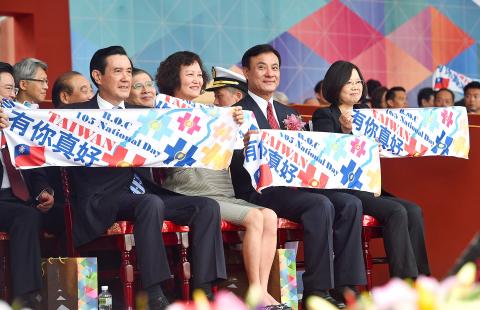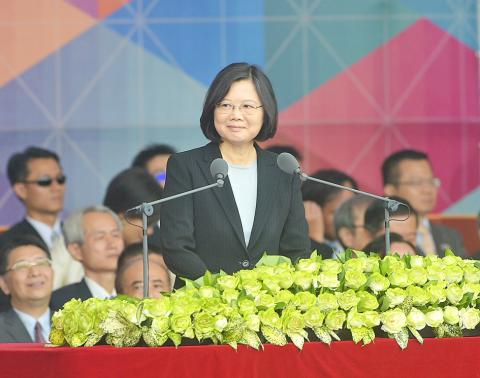President Tsai Ing-wen (蔡英文), in her first Double Ten National Day speech, yesterday urged Beijing to face up to the existence of the Republic of China (ROC) and sit down with Taipei for dialogue, while reiterating what some have termed her “new four noes” for cross-strait relations.
“I call upon the authorities of mainland China to face up to the reality that the ROC exists and that the people of Taiwan have an unshakable faith in the democratic system. The two sides of the Taiwan Strait should sit down and talk as soon as possible,” Tsai said from a podium in front of the Presidential Office Building in Taipei at a ceremony marking the ROC’s 105th birthday.
Despite ups and downs in cross-strait relations in the past months, Tsai said her administration’s position remains the same: No changes in its pledges, no changes in its goodwill, no bowing to pressure and no reversion to the old path of confrontation.

Photo: Peter Lo, Taipei Times
While some political analysts anticipated a certain degree of compromise on the so-called “1992 consensus” in the wake of Beijing’s increased pressure since Tsai took office in May, she did not depart from her previous comments on the issue.
“We respect the historical fact that in 1992, a meeting occurred between the two institutions representing each side across the Taiwan Strait, Taiwan’s Straits Exchange Foundation and China’s Association for Relations Across the Taiwan Straits,” she said.
The two sides should cherish the achievements accumulated through decades of interactions and negotiations since 1992, while promoting stable and peaceful cross-strait relations based on existing political foundations, she said.

Photo: Chang Chia-ming, Taipei Times
Tsai also reiterated the promises she made in her May 20 inaugural address to maintain the “status quo” and conduct cross-strait affairs in accordance with the ROC Constitution, the Act Governing Relations Between the People of the Taiwan Area and the Mainland Area (兩岸人民關係條例), and other laws.
“I also call on the two governing parties across the Taiwan Strait to set aside the baggage of history and engage in positive dialogue for the welfare of people on both sides,” the president said.
Anything conducive to cross-strait peace and the public’s welfare could be included, she said.
The “1992 consensus” refers to a tacit understanding between the Chinese Nationalist Party (KMT) and Beijing that both sides of the Strait acknowledge there is “one China,” with each side having its own interpretation of what “China” means. Former Mainland Affairs Council chairman Su Chi (蘇起) said in 2006 that he had made up the term in 2000.
Turning to domestic issues, Tsai said that her belief that “changing the predicament facing young people is changing a nation’s predicament” has been in the center of each reform her administration has initiated.
The government is endeavoring to expand social housing by 80,000 units over the next four years, build a long-term care system, promote a daycare program, reform the pension systems, revitalize the economy and industry, and push for transitional justice to give young people a healthy and diverse democracy, she said.
“Dear fellow citizens: A road of reform is certain to have its ups and downs. However, I call earnestly on all of you, do not let the ups and downs make you lose hope in Taiwan,” she said.
Tsai said she intends to seek mutually beneficial cooperation with allies rather than one-way giving while proactively and steadfastly seeking a space on the world stage.
As for the nation’s economic dependence on China, Tsai said she aims to redefine Taiwan’s role in the Asia-Pacific region, identify a new driving force for growth and promote her “new southbound policy.”
Tsai’s speech was not the only focus of public attention during yesterday’s ceremony. The interaction of politicians and behavior of other high-profile guests among the 11,000 attendees, including more than 360 foreign guests, was closely watched.
Former president Ma Ying-jeou (馬英九) neither shook hands nor spoke with Tsai, who was separated from him on the grandstand by Legislative Speaker Su Jia-chyuan (蘇嘉全), the chairman of the National Day celebrations, and his wife, Hung Heng-chu (洪恆珠); the pair simply nodded to one another as Tsai returned to her seat after her 18-minute speech.
Former presidential adviser Koo Kwang-ming (辜寬敏), a long-time pro-independence activist, was conspicuous at the beginning of the ceremony when he was the only person to remain seated as everyone else on the grandstand stood and bowed to a portrait of ROC founding father Sun Yat-sen (孫逸仙) that hung at the back of the main stage.
KMT Legislator Wang Jin-pyng (王金平), the former legislative speaker, was among the KMT legislative caucus members not to boycott the ceremony. Speaking to reporters on the sidelines, Wang said that having organized more than 15 National Day celebrations when he was legislative speaker, each year he always hoped that all the invited guests would attend the ceremonies.
“Since I was invited this year, there is no reason I should not come,” Wang said.

SECURITY: As China is ‘reshaping’ Hong Kong’s population, Taiwan must raise the eligibility threshold for applications from Hong Kongers, Chiu Chui-cheng said When Hong Kong and Macau citizens apply for residency in Taiwan, it would be under a new category that includes a “national security observation period,” Mainland Affairs Council (MAC) Minister Chiu Chui-cheng (邱垂正) said yesterday. President William Lai (賴清德) on March 13 announced 17 strategies to counter China’s aggression toward Taiwan, including incorporating national security considerations into the review process for residency applications from Hong Kong and Macau citizens. The situation in Hong Kong is constantly changing, Chiu said to media yesterday on the sidelines of the Taipei Technology Run hosted by the Taipei Neihu Technology Park Development Association. With

CARROT AND STICK: While unrelenting in its military threats, China attracted nearly 40,000 Taiwanese to over 400 business events last year Nearly 40,000 Taiwanese last year joined industry events in China, such as conferences and trade fairs, supported by the Chinese government, a study showed yesterday, as Beijing ramps up a charm offensive toward Taipei alongside military pressure. China has long taken a carrot-and-stick approach to Taiwan, threatening it with the prospect of military action while reaching out to those it believes are amenable to Beijing’s point of view. Taiwanese security officials are wary of what they see as Beijing’s influence campaigns to sway public opinion after Taipei and Beijing gradually resumed travel links halted by the COVID-19 pandemic, but the scale of

A US Marine Corps regiment equipped with Naval Strike Missiles (NSM) is set to participate in the upcoming Balikatan 25 exercise in the Luzon Strait, marking the system’s first-ever deployment in the Philippines. US and Philippine officials have separately confirmed that the Navy Marine Expeditionary Ship Interdiction System (NMESIS) — the mobile launch platform for the Naval Strike Missile — would take part in the joint exercise. The missiles are being deployed to “a strategic first island chain chokepoint” in the waters between Taiwan proper and the Philippines, US-based Naval News reported. “The Luzon Strait and Bashi Channel represent a critical access

Pope Francis is be laid to rest on Saturday after lying in state for three days in St Peter’s Basilica, where the faithful are expected to flock to pay their respects to history’s first Latin American pontiff. The cardinals met yesterday in the Vatican’s synod hall to chart the next steps before a conclave begins to choose Francis’ successor, as condolences poured in from around the world. According to current norms, the conclave must begin between May 5 and 10. The cardinals set the funeral for Saturday at 10am in St Peter’s Square, to be celebrated by the dean of the College